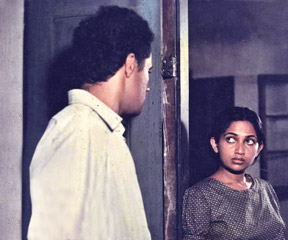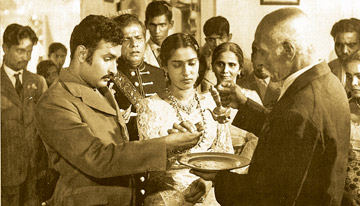Cinegoers return to cinema
By L.S. Ananda WEDAARACHCHI
"It is a good turning point that the masses are coming back to cinema
halls. It is essential that the films should attract the people and they
should be commercially viable. Foreign audiences and the foreign film
market should also be exploited by the local cinema industry," said
National Film Corporation - (NFC) Chairman Asoka Serasingha in an
interview with the Sunday Observer.
Excerpts of the interview:
Q: The present situation of the local film industry is
encouraging since the people have shown an interest in films. How do you
evaluate this situation?
A: No doubt, the local film industry has come to a turning
point. Until the recent past film halls were empty and some of them were
closing down. At present new film halls are opening. For instance three
film halls were opened at Kotahena, Nawalapitiya and Badulla.
A number of film halls are being built in the Jaffna district as
well. The present trend will lead to a better future of the industry.
Q: The production of films calls for heavy investments. Local
film producers who invested millions of rupees during the past three
decades wasted their money mainly due to the absence of viewers. Even
high quality film producers too faced the same fate. What steps are you
going to take to improve the situation?
|

Viragaya |
A: That is the most important challenge we the NFC faces. Film
production is a successful industry in Bollywood, Hollywood, China and
Europe.
The film industry generates profits and foreign exchange. The local
film industry however is in need of good scripts on popular themes.
After the 1970s most of the themes were highly personal and those
appealed only to a limited audience. Before 1970 there were "family
films" which could be enjoyed by the whole family. Even the themes had
on elements of entertainment for the whole family. Some films such as
"Hatara Maha Nidhanaya" directly touched Buddhists' feelings. Recent
productions such as 'Aba', 'Ira Handa Yata' and 'Mahindagamanaya'
brought viewers back to cinema. Local film-makers should learn how to
market their films.
They should not make films based on their personal fancies. They
should know how to attract the viewers who have distanced themselves
from cinema. For this we need to adopt market strategies. Films belong
to a popular culture. We need to build a film culture. The present
market for films is related to history and religion.
Q: the conditions of most of the film halls are very poor due
to the lack of maintenance. This is another area that NFC should look
into.
A: Constructing and modernising cinema halls is a priority.
The number of cinema halls in Sri Lanka has been reduced to 156 from 360
in the 1970s. It shows the fate of the film industry after the 1970s.
The government has already introduced a soft loan scheme to set up
and improve the conditions of the film halls.
|

Gamperaliya |
Q: We import quiet a lot of films from the UK, the USA and
India. As you pointed out Not a single Sri Lankan Film was screened
abroad on commercial basis. Why can't we produce films for foreign
audience?
A: That is a very isolated single target. Our films have been
acclaimed at international film festivals and had won a number of
awards. But not a single Sri Lanka film had been shown to a foreign
audience with the aim of bringing money to the country.
During my first stint as Chairman NFC, I have attended this matter. I
have signed a mutual agreement with the Chinese film industry as a part
of a film exchange project.
We would be screening some of their films in Sri Lanka while they
would screen some of our films in China.
The other was a pact with the Gemini Corporation in India.
They have signed an agreement to produce films on joint project and
exhibit 10 copies of the film in their cinemas in India. Those two
projects will be implemented shortly.
Q: While the Sri Lanka film industry celebrates six and half
decades (65 years) NFC completes four decades in January this year. As
explained the progress shown both film industry and the NFC are not
satisfactory. What will be the other urgent steps which will be taken to
improve the industry.
A: We are stepping into the digital era. Around 16 films have
already been done in digital format and ready for release.
We have given two temporary licences for projection systems to
Majestic and Ricky cinemas. More theatre owners are demanding the
licence but the legislation does not permit us to give permission
immediately.
The necessary amendments will be done and no sooner we get permission
we will allow digital projection facilities to be installed in the
cinemas. The cost by 30 percent can be cut down, if we make digital
films. Since the producers and directors are enthusiastic about the
idea, the changes are needed soon.
Q: NFC assisted young and up coming film directors as well as
script writers who wish to step into the industry in the past. What will
be the future plans for them?
A: We have a study course for those who wish to join the
industry. Short film competitions will be organised to select the best
out of the lot. Foreign assistance such as training will be arranged
with foreign agencies to continue their studies. A program to obtain
foreign training for Sri Lankan film Directors also among the future
plans for the benefit of them. |

